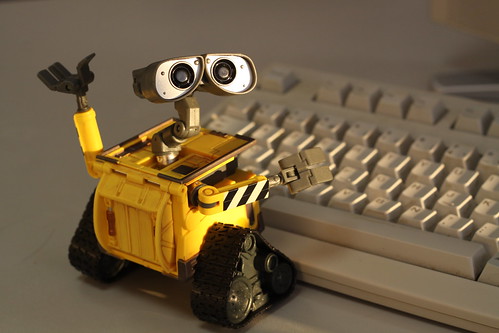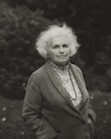So a monkey typing into infinity will eventually produce Shakespeare—or so the theory goes. Maybe robots would be faster?
The New York Times recently discussed the phenomenon of robots writing books. After an encounter with a robo-writer called Lambert M. Surhone—literally a computer churning out titles like “Saltine Cracker” and “Pagan Kennedy” from pasted-together online text—author Pagan Kennedy (yes) was fascinated and preplexed:
Could robots ever be trusted to write original novels, histories, scientific papers and sonnets? For years, artificial-intelligence experts have insisted that machines can succeed as authors. But would we humans ever want to read the robot-books?
Mechanized storytelling is hardly a new idea for the internet age. The blog Brain Pickings explains that nearly a century ago, people were already trying to mechanize the art of narration:
In 1894, French critic Georges Polti recognized thirty-six possible plots, which included conflicts such as Supplication, Pursuit, Self-sacrifice, Adultery, Revolt, the Enigma, Abduction, and Disaster. In 1928, dime novelist William Wallace Cook, author of Plotto: The Master Book of All Plots, did him one better, cataloging every narrative he could think of through a method that bordered on madness. His final plot count? 1,462.
Plotto, reissued last month by Tin House, was a manual that aimed to mechanize the entire narrative trade. In his introduction, Paul Collins recognizes that Cook was something of a plot machine himself, once writing fifty-four novels in a year, more than one a week. Cook’s methods were developed into a Plotto Studio of Authorship in New York City, his book hailed as “an invention which reduces literature to an exact science.”
While still a young director in England, Alfred Hitchcock requested the book from America, and the creator of the courtroom drama Perry Mason claimed he had learned a great deal from it.
Here’s a sample entry from Plotto:
9b. B’s cattle ranch was left to her by her father, and every man B hires as foreman makes love to her sooner or later, and is discharged. B hires A as a foreman on her ranch, and he promises to keep his place and not to make love to her, but B falls in love with him, and it present glad to learn that A’s sole purpose in taking the job of foreman was to win her love.”
 Like Lambert Surhone, Plotto and the other story-writing machines may seem mindless and formulaic. But in the Chronicle of Higher Education, Kenneth Goldsmith argues the opposite may be true. He teaches a class at at the University of Pennsylvania called “Uncreative Writing,” in which students “are rewarded for plagiarism, identity theft, repurposing papers, patchwriting, sampling, plundering, and stealing”—just the kind of work Lambert Surhone does. Goldsmith readily acknowledges the pitfalls of this kind of writing, but done properly, he suggests, it might help revitalize literature:
Like Lambert Surhone, Plotto and the other story-writing machines may seem mindless and formulaic. But in the Chronicle of Higher Education, Kenneth Goldsmith argues the opposite may be true. He teaches a class at at the University of Pennsylvania called “Uncreative Writing,” in which students “are rewarded for plagiarism, identity theft, repurposing papers, patchwriting, sampling, plundering, and stealing”—just the kind of work Lambert Surhone does. Goldsmith readily acknowledges the pitfalls of this kind of writing, but done properly, he suggests, it might help revitalize literature:
I’m not saying that such writing should be discarded: Who hasn’t been moved by a great memoir? But I’m sensing that literature—infinite in its potential of ranges and expressions—is in a rut, tending to hit the same note again and again, confining itself to the narrowest of spectrums, resulting in a practice that has fallen out of step and is unable to take part in arguably the most vital and exciting cultural discourses of our time. I find this to be a profoundly sad moment—and a great lost opportunity for literary creativity to revitalize itself in ways it hasn’t imagined. […]
After a semester of my forcibly suppressing a student’s “creativity” by making her plagiarize and transcribe, she will tell me how disappointed she was because, in fact, what we had accomplished was not uncreative at all; by not being “creative,” she had produced the most creative body of work in her life. By taking an opposite approach to creativity—the most trite, overused, and ill-defined concept in a writer’s training—she had emerged renewed and rejuvenated, on fire and in love again with writing.
Goldsmith’s essay is fascinating and well worth a read in its entirety. And tell us: What do you make of robot writing? If humans create literature by “repurposing papers, patchwriting, sampling, plundering, and stealing,” are they any different from robot “writers” like Lambert Surhone? Or are they, as Goldsmith suggests, possibly the way of the future?
Further Reading:
- Repurposing spam as poems—or fiction.






